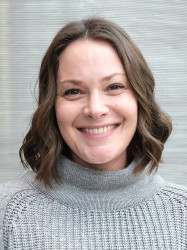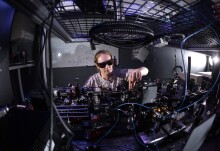

Alumnus Jonathan Firth (Mechanical Engineering 1981) returned to Imperial on Tuesday 29 September to speak at Space Lab's third Annual Conference.
A member of the leadership team at Virgin Galactic since its inception in 2004, Jonathan is the Executive Vice President of Spaceport & Program Development and oversees the company’s activity to ready itself for commercial operations in New Mexico.
Watch Jonathan discuss the future of travel at the Imperial Space Lab Annual Conference:
Jenn Bywater caught up with him to find out how his time at Imperial prepared him for his current role.
You’re the fourth generation of your family to be a mechanical engineer. Did you always know that’s what you wanted to do?
No, I don’t think so, but my father was quite happy. I really didn’t try and steer my son towards mechanical engineering but he’s become our fifth generation engineer!
Tell us about your journey from Imperial to Virgin Galactic.
When I graduated I went to work on projects for an oil and gas contractor. Since then I’ve been doing one form of project management or another and working myself out of a job on a permanent basis. I knew very early on that I didn’t want to pursue a technical discipline; I was more interested in the way that businesses manage risk, and organize themselves to deliver projects and the end user experience, and understanding how people can combine to form an effective team, good ways of communicating, planning schedules and critical path analysis.
I worked with London Underground to modernise the Central and Northern Lines, and we built a public private partnership to fund and procure the rolling stock on the latter. When the national rail industry was privatised, Virgin Trains asked me to do the same for the franchises they had won. I moved from there to Virgin Atlantic and when we started Virgin Galactic, we incubated it with people from different Virgin businesses and I got the opportunity to be the ‘project guy’.
How has your time at Imperial prepared you for your role?
With hindsight, I learnt to enjoy myself. I think the activities that I participated in brought me out as a person. I did programmes on IC Radio, I was Chairman of the Publications Board, publisher of the newspaper and Chair of Union General Meetings in my third year. It opened up my social side and I found it to be very good experience in public speaking, chairing meetings, planning and working with limited finances!
I think that studying engineering at Imperial puts you in a great position to be ready for opportunities that arise in your career. It allows you to do a wide range of things and doesn’t predestine you, as my career has shown, to working in any one area. It gives you a good sense of judgement which you can take into various fields.
What’s it like working with Richard Branson?
He’s always interested in what’s going on in the various Virgin businesses and he’s in weekly contact with us at Virgin Galactic, but he does let the management teams run their own operations. He’s always said that he’s going to be on our spaceship’s first commercial flight when we finish testing, because he wants to do it, and also because he wouldn’t ask people to do anything that he wouldn’t do himself.
What was the morale like within the team after the crash?
It was a very difficult time. It came at the end of October and it wasn’t until early this year that people started to throw that off a bit. We had great support from the Virgin Group and we were wrapped in this family feeling of support, in everybody wanting us to succeed and bounce back. Richard’s support was unwavering. Obviously, we didn’t want this to happen but it happened on a test flight and that’s what tests are for. It didn’t happen with passengers.
What role does Virgin Galactic play within the space industry?
When we started in 2004 our focus was on the great untapped market of people who want to have a space flight experience. Over time that has developed into a business that is all about providing access to space in a lower cost, more flexible, customer-focussed and frequent way than ever before. When we realised that the carrier aircraft approach, which we use to lift our suborbital spaceship into the sky, could also be used to deploy an orbital small satellite launch vehicle, it didn’t actually seem so strange to us to go into that market because it is one that has grown a lot and that’s quite under-served. Our proposition is to be flexible and fly frequently – we could even come to you and get your satellites and put them in space.
We’re an operator first and foremost, like other Virgin companies in transport. The only reason that we are now also a spaceship builder and tester is because there isn’t anyone else to do it for us. If we could have bought a space ship off the shelf, we would have! This was a big step into the unknown for us.
Where do you see things going in the future?
We’re aiming to get our satellite launch vehicle into test flight within about a year of getting back into test flight with the spaceship, so we may be bringing those two things to market within a year or two of each other.
Further than that, it’s hard to predict where things will go. Things are moving at such a pace now that I don’t think you can anticipate everything. You have to watch what’s going on, be well placed and have the capability to take advantage of opportunities rather than making predictions.
We’re doing a lot of outreach in New Mexico to try and show kids the value of STEM subjects - we’re supporting the local Challenger Centre, which just opened in Las Cruces where groups of students in Grade 6 go on simulated missions to the International Space Station or intercept a comet. We’ve also had a lot of discussions with local universities as potentially they’re a pipeline for employees. They could also do research for us when we run into operational issues, and they could put research payloads on our spaceships.
What advice would you give to anyone considering a career in the space industry?
If you can, I think that you should follow your interests and your passions, and the space industry provides great opportunities to do that in all sorts of ways, working for an established organization or starting up something yourself. We do have to live as well and salary comes into it but don’t be swayed by that, especially in the early years of your career, because it’s fundamentally important at that stage to get great quality experience.
Article text (excluding photos or graphics) available under an Attribution-NonCommercial-ShareAlike Creative Commons license.
Photos and graphics subject to third party copyright used with permission or © Imperial College London.
Reporter

Jenn Rowater
Advancement

Contact details
Tel: +44 (0)20 7594 6697
Email: j.rowater@imperial.ac.uk
Show all stories by this author




